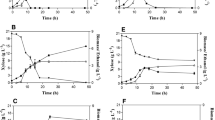Summary
To improve single step conversion of sugar mixtures containing cellobiose, glucose, and xylose to ethanol by a coculture of Zymomonas anaerobia and Clostridium saccharolyticum, an ethanol tolerant mutant of C. saccharolyticum was obtained. The mutant obtained by the enrichment procedure was able to grow in the presence of 75 g·l-1 ethanol, with improved ability to utilize cellobiose, and little or no change in its ability to convert xylose to ethanol. This mutant in coculture with Zymomonas anaerobia produced over 50 g·l-1 ethanol in media containing 130 g·l-1 total sugars comprising of 60% glucose, 20% cellobiose, and 20% xylose.
Similar content being viewed by others
References
Asther M, Khan AW (1984) Influence of the presence of Zymomonas anaerobia on the conversion of cellobiose, glucose and xylose to ethanol by Clostridium saccharolyticum. Biotechnol Bioeng 26:970–972
Giuliano C, Khan AW (1984) Cellulase and sugar formation by Bacteroides cellulosolvens, a newly isolated cellulolytic anaerobe. Appl Environ Microbiol (in press)
Giuliano C, Asther M, Khan AW (1983) Comparative degradation of cellulose and sugar formation by three newly isolated mesophilic anaerobes and Clostridium thermocellum. Biotechnol Lett 5:395–398
Gray WD (1945) The sugar tolerance of four strains of distiller's yeast. J Bacteriol 49:445–452
Berrero AA, Gomez RF (1980) Development of ethanol tolerance in Clostridium thermocellum: Effect of growth temperature. Appl Environ Microbiol 40:571–577
Howell JA, Stuck ID (1975) Kinetics of Solka-Floc cellulose hydrolysis by Trichoderma, viride cellulase. Biotechnol Bioeng 17:873–893
Khan AW, Trottier TM (1978) Effect of sulfur-containing compounds on anaerobic degradation of cellulose to methane by mixed cultures obtained from sewage sludge. Appl Environ Microbiol 35:1027–1034
Khan AW, Trottier TM, Patel GB, Martin SM (1979) Nutrient requirement for the degradation of cellulose to methane by a mixed population of anaerobes. J Gen Microbiol 112:365–372
Rolz C, de Cabrera S, Calzada F, Garcia R, de Léon R, del Camrmen de Arriola M, de Micheo F, Morales E (1983) Concepts on the biotransformation of carbohydrates into fuel ethanol. In: Mizrahi, A, Van Wezel AL (eds) Advances in biotechnological processes, vol 1. Alan R Liss, Inc New York, pp 97–142
Rosenberg SL (1980) Fermentation of pentose sugars to ethanol and other neutral products by microorganisms. Enz Microbial Technol 2:185–188
Timell TE (1967) Recent progress in the chemistry of wood hemicelluloses. Wood Sci Technol 1:45–70
Thomas DS, Hossack JA, Rose AH (1978) Plasma-membrane lipid composition and ethanol tolerance in Saccharolyticum cerevisiae. Arch Microbiol 117:239–245
Author information
Authors and Affiliations
Additional information
Issued as NRCC No. 23936
Rights and permissions
About this article
Cite this article
Asther, M., Khan, A.W. Improved fermentation of cellobiose, glucose, and xylose to ethanol by Zymomonas anaerobia and a high ethanol tolerant strain of Clostridium saccharolyticum . Appl Microbiol Biotechnol 21, 234–237 (1985). https://doi.org/10.1007/BF00295128
Received:
Issue Date:
DOI: https://doi.org/10.1007/BF00295128




